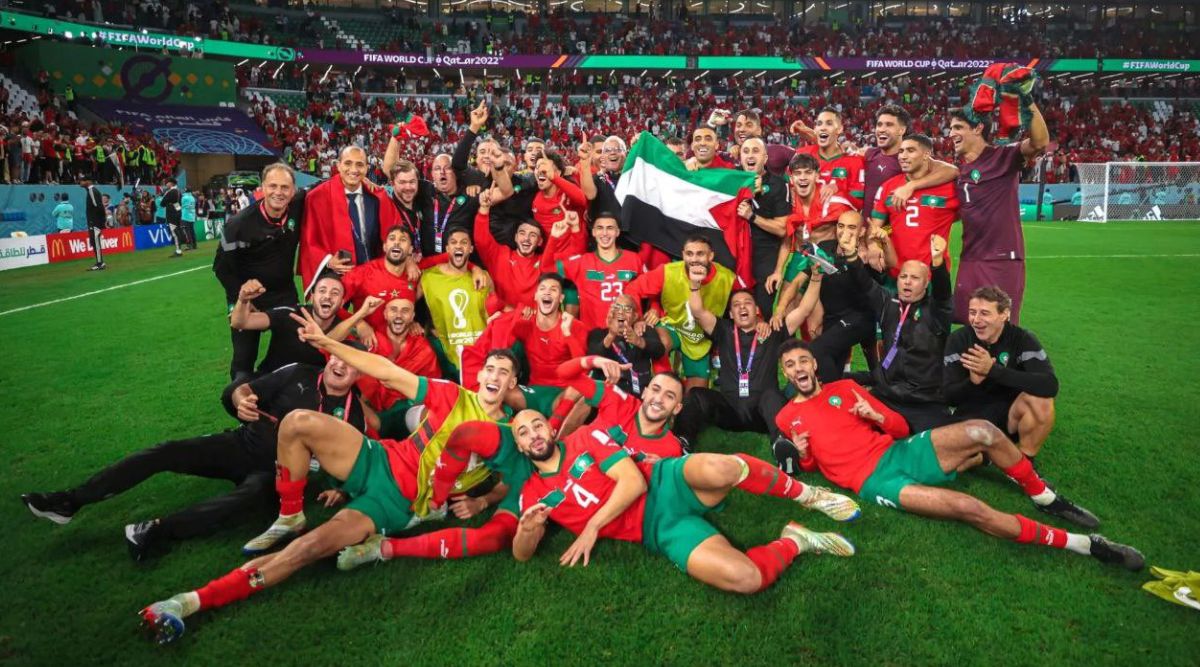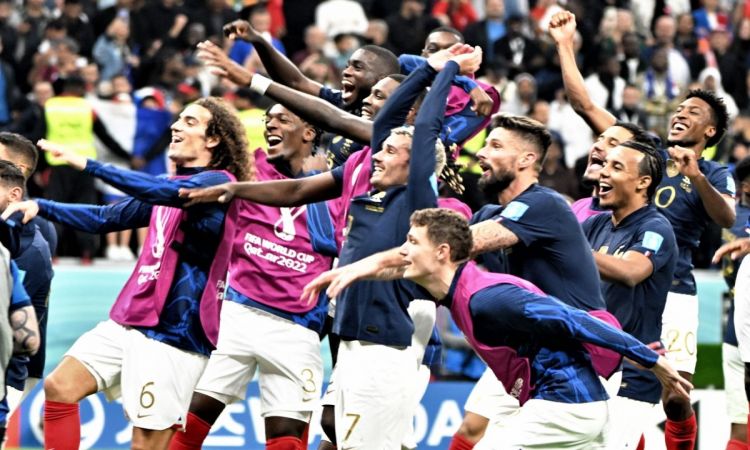Morocco versus France: A Fifa World Cup semi-final with the baggage of a colonial past

Today’s latest Fifa World Cup semifinal between Morocco and also France is scheduled. You might also be very surprised to learn that the two nations have a complicated relationship. For example, Morocco’s prized football team is still influenced by its colonial past.
A complicated relationship between the main two countries will mainly serve as the backdrop for the football game when Morocco also takes on France in the semifinal of the current Fifa World Cup in Qatar. The majority of present-day Morocco was also a French colony from 1912 to 1956.
Even though Morocco is a sovereign country today, and French colonialism is still felt in a great number of aspects of Moroccan politics and also society. The common relationship between the two countries is still warm but contentious. The Indian Express also examines the historical setting of tonight’s football game and also how Morocco’s incredible run in the competition is already a metaphorical victory over neocolonialism.
Morocco versus France: A global cultural mashup that captured the public’s attention-
Morocco is a mountainous nation at the northernmost point of Africa. It is bordered by the Atlantic Ocean to the west and the Mediterranean Sea to the north, and it lies beyond the westernmost point of the Sahara desert. The Moroccan football team is known as the “Atlas Lions” because of the Atlas Mountains, which run through its entire length.
Morocco has a unique blending of Arab, Hispanic, and French influences, among other cultures, due to its location at the meeting point of Europe and Africa.
Morocco’s picturesque countryside, unspoiled coastline, and vibrant cities have long captured the attention of tourists, with the ancient city of Fez serving as the country’s cultural and spiritual hub. But today, Humphrey Bogart and Ingrid Bergman’s timeless classic “Casablanca,” which portrays Morocco in a romantic light, has a significant influence on how the West (and perhaps the rest of the world) think of the country. Morocco’s largest city and most important port is Casablanca. It is also one of its political hubs and served as the focal point of Morocco’s post-World War II anti-colonial struggle.
Influence of French rule and culture-
Until 1912, the Moroccan sultans were able to fend off direct European colonisation, but since the start of the 19th century, Spain and France have been competing for influence in the area and slowly eroding the sultan’s autonomy. The majority of Morocco fell under French rule in 1912, with Spanish Sahara to its south and a smaller protectorate of Spain in the country’s northernmost tip.
Through the Sultan’s symbolic authority and a European-style bureaucracy that exercised varying degrees of real power throughout the country, the French were able to rule over Morocco. The plan was to maintain the Moroccan ruling class so that it could continue to exercise real power without facing significant public opposition.
The French placed a heavy emphasis on “Europeanizing” Morocco, creating new master-planned communities, and funding francophonic education. By the time of its end, Casablanca had grown to almost a million people, and many facets of Moroccan life had been influenced by French culture.

The old cities of Morocco, which served as the population’s spiritual and cultural hubs, were left untouched by France. Morocco kept many of its pre-colonial institutions in place throughout colonial rule while also absorbing French culture. Moroccan culture and identity have always been a syncretistic blend.
Moroccan resistance to colonialism
Ideas of liberty and equality that were absent from the ostensibly tranquil and picturesque French colony were introduced with French education. France used the classic “divide and rule” strategy, pitting the indigenous Imazighen people (often referred to as Berbers) against the Arabs, who had migrated to the area over centuries of Arab rule and conquest. This was done as nascent nationalist sentiments spread throughout the country.
However, burgeoning anti-colonial sentiments that evoked a past whose symbols were very much a part of the present were unabated by this ruse. Because France chose to rule through the traditional elites of the area, the ruling class was preserved, and by World War II, the Sultan had become a symbol for nationalists.
Morocco experienced both danger and hope as a result of the War and the fall of France: on the one hand, France, its colonial overlord, was itself occupied by the Germans; on the other hand, American and other allied forces quickly landed in Morocco and used the country as a base of operations.
Short-lived was the hope that Morocco would gain independence after the War. Although independence appeared to be a foregone conclusion, it would require a concerted effort during which the blatant injustices of colonial rule would occur more frequently.
Morocco’s colonial history, which the outside world frequently saw as a benign process of acculturation, was marred by brutal excesses, the repression of dissent, and overt hegemonic rule. Nationalists were frequently imprisoned without being given a chance to defend themselves, exiled to other French colonies, or even killed through political violence supported by France. Nationalists and French troops even engaged in military combat during the final years of French rule, reportedly resulting in the deaths of 1,000 men.
In 1956, Morocco finally achieved constitutional monarchy status and became an independent nation. However, even after formal colonialism ended, France continued to have an impact on the young country.
Morocco’s journey toward independence while still under French rule
Many aspects of Moroccan life are heavily influenced by France, even decades after Morocco gained independence. The former colony continues to receive the most foreign investment from France, who also enjoys travelling there. Morocco and France continue to have a close relationship despite tensions due to Morocco’s economic dependence on France and its sizable francophone population. Many Moroccans now view the French more favourably as the visceral trauma of colonialism recedes further into history.
The contours of Morocco’s relationship with France, however, frequently mimic the hierarchies of former colonies. For instance, a large portion of Moroccan industry is financed by French investors, with profits going to them rather than to locals. Morocco has also served as a reliable “Arab ally” for NATO and France, frequently at the expense of its own interests.

Brain drain is a harmful result of colonialism.
Five million Moroccans are thought to be living abroad at this time, with the majority of them concentrated in France and other parts of Europe. According to a 2018 survey by Morocco World News, 91% of Moroccan professionals between the ages of 35 and under are considering leaving their country in search of better living and working conditions.
Colonialism has frequently been cited by academics as the primary cause of such labour migration. Migration across many former colonies is fueled by both the conditions created by colonial rule and the global capitalist economy, which continues to divide the world along former colonial lines into a Global North and South. And Morocco is no different.
It is easy to understand the macroeconomic impact of colonial migration: developed countries—often the former colonizers—benefit at the expense of developing countries (former colonies). In this way, “brain drain” is undoubtedly one of the worst effects of colonialism and a key aspect of neocolonialism.
The victory of Moroccan football over “footballing brain drain”
This World Cup has also been as much a success for Moroccan soccer as it has been a victory over the “brain drain” in soccer. Many of Morocco’s key players were raised as footballers even though they were born outside of the country.
Players like Hakim Ziyech, Noussair Mazraoui, and also Sofyan Amrabat were raised in the Netherlands, while Romain Saiss and also Soufiane Boufal were born in France. Achraf Hakimi was raised in Spain. 16 of the squad’s 26 players were either born abroad or spent part of their upbringing there; coach Walid Regragui was born in Paris.
It is already a victory that all of these players represent Morocco and not the nations to which they or their parents emigrated. Many African countries have had difficulty luring such talent.
In fact, France’s rivalry with Morocco serves as the best illustration of this. Players with origins outside of France, most frequently in one of its many colonies, make up nearly all of the French team. The 2018 World Cup winning team was praised as an illustration of France’s inclusivity and diversity.
However, the story of how African nations failed to benefit from the talents of their most talented players is hidden behind the heartwarming tales of Guinean Paul Pogba mainly scoring for France in the World Cup final or Mali’s N’golo Kante managing the French midfield.
This is, in many ways, the tale of African football. Even though football is the most popular sport on the continent, the best African footballers are frequently either born outside of Africa or are sent there as young children after being discovered by European scouts. As a result, African teams continue to be poorer.
Morocco has been successful in persuading its best players to play for Morocco instead of the glitz and glamour of Europe. Hakim Ziyech almost made the Netherlands’ World Cup roster in 2018, but he could have played for them very easily. However, after a falling out with the coach over “attitude issues,” Morocco seized the chance to give him a chance to play for their national team. Like Achraf Hakimi, who chose to play for Morocco despite being eligible to play for Spain. These rumours are prevalent among the Moroccan team.

Through opportunism, the demonstration of fundamental football skills, and carefully crafted nationalist rhetoric, Morocco has developed a talented team that has advanced all the way to the Fifa World Cup semifinals. By doing this, it has achieved a symbolic win over the neocolonial “brain drain” process.
edited and proofread by nikita sharma




